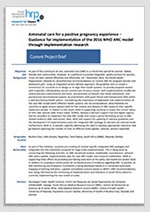New antenatal care model in Africa and India (NAMAI) study: an implementation research trial to improve antenatal care using WHO recommendations
HRP Project Brief

Overview
Four countries, including Burkina Faso, India, Rwanda and Zambia, were prioritized to participate in a focused effort leading to a mixed methods implementation trial, aimed to improve understanding of and evidence base on how to design and implement an antenatal care (ANC) platform within each country’s health systems.[1] In addition, Rwanda and Zambia will implement and test the adapted version of the WHO digital ANC module for health workers.[2] The ongoing research seeks to demonstrate how quality, integrated and person-centred care can be implemented and eventually lead to better maternal and perinatal outcomes with pathways to scale up within and beyond the selected countries for lessons, to be shared globally.
[1] ISRCTN registry. Improving antenatal care using WHO recommendations: an implementation research study in Africa and India 2022 [Available from: https://www.isrctn.com/ISRCTN16610902].
[2] Muliokela R, Uwayezu G, Tran Ngoc C, Barreix M, Tamrat T, Kashoka A, et al. Integration of new digital antenatal care tools using the WHO SMART guideline approach: Experiences from Rwanda and Zambia. Digit Health. 2022;8:20552076221076256.
